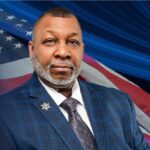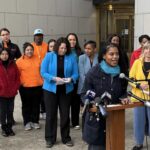ATLANTA — The Southern Christian Leadership Conference (SCLC), founded by the giants of the American civil rights movement, has spent years in decline and power struggles. Now the once-proud organization faces what might be a final blow with the refusal of the Rev. Martin Luther King Jr.’s daughter to take the helm.
By Friday, following the recent indictment of a former national chairman on theft charges, King’s one-time lieutenants and his daughter had come to the conclusion that the group — which led the movement to end segregation in public facilities and open access to the ballot box for millions of black Americans — might have run its course.
“We should’ve closed it down years ago,” former United Nations Ambassador Andrew Young, one of Martin Luther King Jr.’s closest advisers, said Friday after the Rev. Bernice King’s announcement. “I saw this as a lost cause a long time ago.”
The Rev. Joseph Lowery, the SCLC’s longest-serving president and 2010 recipient of the Presidential Medal of Freedom for his work during the civil rights movement, said he spoke with Bernice King on Friday.
“She and the board couldn’t find common ground, so I think she did the wise thing, rather than enter into a relationship with built-in turbulence,” Lowery said, adding that he was saddened by what has happened to the organization.
When King became the first woman elected SCLC president in 2009, she vowed to reinvigorate the organization by expanding the group’s reach to more women and a younger generation.
Soon after, the SCLC’s chairman and treasurer were accused of financial mismanagement, and squabbling among the group’s leaders landed the splintered factions in a courtroom. She put off taking her oath as president of the landmark civil rights group co-founded by her father, remaining largely silent as the group’s troubles escalated over the past 16 months.
King told The Associated Press that in the end, she and the group’s leaders didn’t agree on how to move forward.
“In light of that, and attempts on several occasions to try to reach out and dialogue, this is where I’ve landed,” she said. “Essentially, I knew that I was not going to be merely a figurehead, so I had to make a critical decision. I look forward to continuing the legacies of my parents and establishing my own legacy.”
Although she called the SCLC’s recent troubles unfortunate, King stopped short of saying the SCLC should disband.
“They have chapters around the nation who hold the name SCLC and they are doing different kinds of work in their communities,” King said. “They have an opportunity … to decide and redefine how they want to be projected in the public.”
King said she notified board leaders of her decision last Thursday. Now, she said she is focusing on other endeavors.
This week, King launched a 100 Days of Nonviolence campaign at the Coretta Scott King Academy, named for her mother. The initiative is in response to the shootings in Tucson, Ariz., which claimed six lives and left U.S. Rep. Gabrielle Giffords recovering from a gunshot wound to the head.
King also plans to republish her mother’s book, “My Life with Martin Luther King Jr.,’’ and release the King matriarch’s never-before published autobiography.
Andrew Young, also a former Atlanta mayor, said Bernice King’s departure from the organization was “wonderful.”
“I tried to get Bernice to see when she wanted to revive it that it wasn’t worth wasting her talents on, that we needed to let it go,” Young said. “That doesn’t mean that there’s not work to be done.”
Founded by African American ministers in Atlanta in 1957 following the successful Montgomery Bus Boycott, the SCLC under Martin Luther King Jr. advocated non-violent protest as it worked to bring equality to blacks, particularly in the South.
The group played a major role in the March on Washington, as well as civil rights campaigns in Birmingham and Selma, Ala. The group’s efforts helped lead to the end of segregation and the passage of the Civil Rights Act of 1964 and the Voting Rights Act of 1965. The SCLC also spoke out against poverty, racism and war.
“It did its work well,” Young said. “But it was never any law that said we all had to stay together for the rest of our lives. I don’t believe in keeping organizations alive just for the sake of the name.”
SCLC Chairwoman Sylvia Tucker said she was stunned by King’s decision.
“We have to continue to move forward, because there’s such a need out there,” Tucker said. “Having a president doesn’t determine what our mission is, to really take care of the least of these.”
Tucker said she was not sure when a new president might be elected.
As its president from 1957 until his assassination in 1968, Martin Luther King Jr. was the face of the SCLC for the major battles of the civil rights era. He was succeeded by the late Rev. Ralph Abernathy, who served from 1968 until 1977, and then Lowery from 1977 until 1997. Lowery then turned the organization over to Martin Luther King III, who headed it from 1998 to 2003.
“It has so many problems,” said Lowery, the president emeritus of SCLC. “Fighting without, fighting within … Unless they find a grip on reality soon, I think outside forces will determine their fate and the organization won’t have to do anything about it at all.”
At a press conference after her election, Bernice King said she was eager to rejuvenate the group.
But the news weeks later that the SCLC was looking into allegations that its chairman and treasurer had mismanaged funds threw its board of directors into chaos as members chose sides. By the spring, the dispute over who controlled the SCLC was headed to court. The group had split into two factions, both claiming to be in charge and making decisions on behalf of the entire organization.
Bernice King led a prayer for unity within the group in August, calling for an end to the hard feelings. In September, a judge ruled that the directors siding with King were the group’s legitimate leaders.
The former chairman, the Rev. Raleigh Trammell — the subject of the federal and internal probe — was indicted last week on charges including grand theft involving a meal program for low-income seniors in southwest Ohio.
The Rev. Markel Hutchins, who at one time claimed the presidency of the SCLC during the period of infighting, said Friday that the ongoing strife among the group has been about “the soul, future and integrity of the SCLC.”
“We will fight like hell to reclaim the organization that has, at this moment, been stolen by those who have not been longtime participants in the struggle for human dignity,” Hutchins said.
Associated Press






